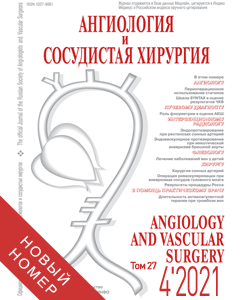Journal «Angiology and Vascular Surgery» •
2005 • VOLUME 11 • №2
PREDICTIVE SIGNIFICANCE OF INSULIN RESISTANCE AND METABOLIC SYNDROME FOR ASSESSMENT OF THE DEGREE OF ENDOTHELIUM DYSFUNCTION AND EARLY SIGNS OF ATHEROSCLEROTIC LESION
G.Ye. Roitberg, Ye.A. Artamonova, T.I. Ushakova
Chair of Familial Medicine, Faculty for Advanced Medical Training,
Russian State Medical University,
Moscow, Russia
The contribution of the clinical or laboratory risk factors associated with the metabolic syndrome to the changes in peripheral vascular reactions and to the natural history of atherosclerosis has not been established until now. The aim of the work was to study interrelations between the risk factors entering the symptom complex of the metabolic syndrome, to assess their impact on endothelium-dependent vasodilatation and constrictor component of vascular reactivity as well as on the change in the thickness of the intima-media complex (TIMC) of the common carotid artery (CCA). The study accrued 122 practically normal men aged 35 to 50 years.Stepwise multiple regression analysis has established interrelations between the disorder of vasoregulating endothelium function and the intensity of atherosclerotic lesion according to the maximal value of the TIMC of the CCA, glucose concentration 120 min after glucose load, IMT, the signs of arterial hypertension. The data have been obtained that confirmed the hypothesis of the role played by endothelium dysfunction manifesting by the disturbance of vasoregulating function, as an early marker of atherosclerosis. Carbohydrate metabolism, tissue sensitivity to insulin and the presence of arterial hypertension were most significant predictive factors of the TIMC of the CCA and disorder of arterial wall function.
KEY WORDS: endothelium dysfunction, atherosclerosis, insulin resistance, prediction.
P. 19
ARCHIVES MAGAZINE
2021 (Vol.27)
2020 (Vol.26)
2019 (Vol.25)
2018 (Vol.24)
2017 (Vol.23)
2016 (Vol.22)
2015 (Vol.21)
2014 (Vol.20)
2013 (Vol.19)
2012 (Vol.18)
2011 (Vol.17)
2010 (Vol.16)
2009 (Vol.15)
2008 (Vol.14)
2007 (Vol.13)
2006 (Vol.12)
2005 (Vol.11)
2004 (Vol.10)
2001 (Vol.7)
2000 (Vol.6)
1999 (Vol.5)
1998 (Vol.4)
1997 (Vol.3)


